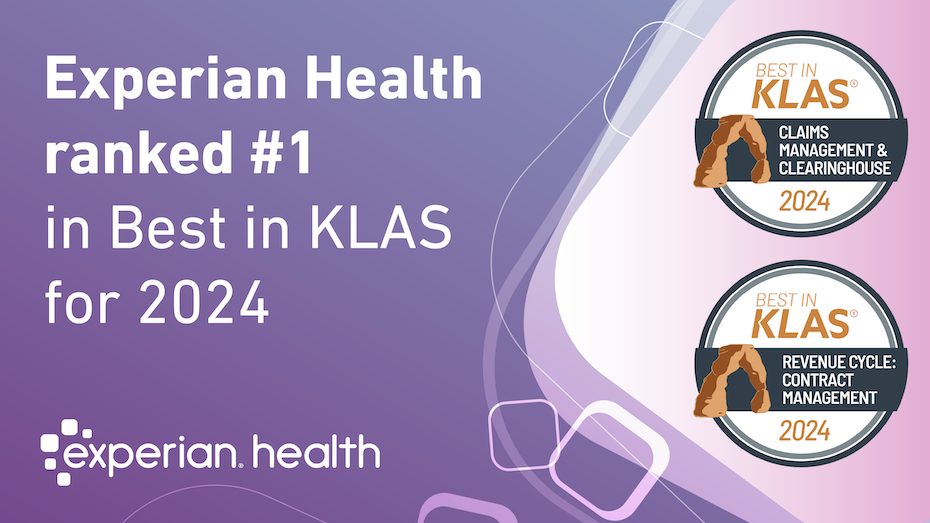Claims & Contract Management
Improve financial performance with automated, clean and data-driven medical claims management.

“As the IU Health Revenue Cycle team rallied to respond to the claims processing disruption, we were uniquely positioned with our long-time Experian partnership to quickly re-institute critical claims routines and restore a significant volume of claims transmissions. This would not have been possible without Experian's nimble and comprehensive approach, immediately applying talented and committed resources that leveraged existing Experian platform infrastructure.” – Bryan Daniels, Vice President Revenue Cycle Solutions, IU Health Challenge Indiana University Health (IU Health) is the largest network of physicians in Indiana comprised of over 38,000 team members and 2,717 available beds. Based in Indianapolis, Indiana, the organization has dozens of facilities statewide and is on a mission to make the state one of the healthiest in the nation. In February 2024, IU Health found itself impacted by the cybersecurity incident so many providers across the country abruptly faced. They were unable to send claims to insurance companies and their revenue cycle operations came to screeching halt. Knowing they needed a trusted solution fast, the revenue cycle leadership team asked Experian Health if they could help. Solution Conversations advanced quickly and the Experian Health team was able to implement its Best in KLAS ClaimSource® platform within a week. ClaimSource is an innovative claims management solution designed for scalability and improves revenue streams by minimizing denials. By using automation, it boosts operational efficiency by prioritizing claims, payments, and denials, allowing users to tackle high-impact accounts promptly. Outcome Thanks to ClaimSource, IU Health achieved the following results: Accelerated $632 million in claims transmissions in the first five days of business. Processed $1.1B of claims backlog by March 27. “We value our longstanding partnership with IU Health and it's very rewarding that we were able to help in a very critical situation,” said Jason Considine, Experian Health's Chief Commercial Officer. “We know IU Health places the utmost importance on patient care, and being an important part of our client's solution to deliver on their service commitment is reflective of our service commitment to simplify healthcare.” Learn more about how ClaimSource can help your healthcare organization accelerate cash flow, reduce denials and optimize efficiency.

Healthcare leaders often zero in on how uninsured rates affect their bottom line. But another patient group presents a quieter financial dilemma for providers: those with multiple active health plans. In these cases, it's important to ensure each plan pays the right amount – in the right order. Should any confusion arise, providers may end up with their claims being denied, resulting in underpayments. This is where the coordination of benefits (COB) process comes in. What is coordination of benefits (COB) and why is it important? When a patient is covered by more than one plan, the “coordination of benefits” process kicks in to help health plans figure out their respective payment responsibilities. With patients often having multiple insurance policies, ensuring that each policy pays its share is vital. The purpose of coordination of benefits is to prevent overpayment or duplication of benefits, ensuring that the total benefits paid do not exceed the actual cost of the service received. Integrating a digital COB solution within registration and scheduling workflows can help providers ensure they bill primary and secondary payers correctly, preventing unnecessary claim denials. Challenges of coordination of benefits Coordination of Benefits is a pivotal aspect of RCM, but it's not without its hurdles. Here's a look at the complexities that often arise: Overlapping Policies: Determining which policy pays first can be confusing. Patients with dual coverage might not always be aware of the hierarchy, leading to billing complications. And many legacy systems only select the primary, without consideration for secondary or tertiary. And regional plans add another layer of complexity. Claim Denials: Incorrect coordination of benefits can lead to claim denials or overpayments. This not only affects revenue but also strains the patient-provider relationship when patients are billed incorrectly. Administrative Burden: Manual COB verification is time-consuming and prone to errors. Staff often spend hours cross-referencing policies, which could be better spent on patient care. Coordination of benefits: the dream vs. reality In an ideal world, patients would register for care weeks ahead of their scheduled treatment. During the registration process, they would inform the provider of all their active insurance coverage, with correct and complete details close to hand. No plan would go unmentioned, and no policy number misplaced. Registration staff would quickly enter the information into their EMR without error, so coverage could be verified in real-time. The reality is far different. Recent findings show that 65% of consumers struggle to understand what their health insurance covers. They do not carry copies of their insurance cards. They may not be aware that they are covered under a relative's health plan. Patient access teams are under-staffed and over-stretched, with little time to ask guiding questions that would uncover additional insurance. Coordination of benefits efforts should start as soon as it becomes apparent that a patient has active coverage under multiple plans. Unfortunately, the messy reality of coverage discovery and patient registration means patients and providers are left in the dark until a claim is denied. The payer rejects the claim for a COB-related reason, leaving billers with no clue how to resolve it. The problem gets worse from there. Automating coordination of benefits for faster, cleaner claims As with all aspects of healthcare billing, there are many complex rules and regulations governing COB transactions. Under HIPAA, health plans and payers (including Medicare and Medicaid) must coordinate benefits for each patient and determine the primary and secondary payers. Tracking this manually is extremely challenging for providers: using the information provided by the patient (which may or may not be accurate), staff would contact each payer by phone or email to verify coverage. They would then review the COB rules and guidelines for each health plan to determine the primary payer and follow specific rules for billing secondary payers. It's no wonder that COB transactions are now among the most automated administrative tasks. Automating coordination of benefits not only saves staff time, but also increases the chances of finding all active coverage, collating complete insurance profiles for the patient, and making an accurate primacy determination. Digital systems also make it easier for providers and payers to communicate with one another, facilitating smoother dispute resolution and regulatory compliance. Patient Access Curator brings real-time COB to EH clients In late 2023, Experian Health acquired Wave HDC, bringing clients a new and unrivalled package of real-time coverage and benefits solutions based on AI-powered data curation. This new solution, Patient Access Curator, helps healthcare billing teams prevent claim denials in seconds through real-time data analysis. This includes COB curation, which automatically analyzes payer responses to identify hidden cues that staff cannot see. If other insurance is identified, the tool alerts the user and triggers additional queries to verify active coverage and build a complete insurance profile for the patient. Each policy is then analyzed further to determine the patient's primary, secondary and tertiary coverage, reliably sifting out any non-billable coverage. Since 2020, the technology powering Patient Access Curator has prevented denials amounting to more than $1 billion. Integrating coordination of benefits automation yields savings throughout the revenue cycle Integrating COB automation with other RCM tools, such as coverage discovery and eligibility verification, means providers can prevent and manage denials in a single workflow. Doing this during patient registration allows teams to resolve issues in the early stages of the revenue cycle, rather than wait to deal with them once claims are denied. While catching errors on the front-end results in faster patient registration and clean claims first time, the tool adds value later in the revenue cycle, too. Streamlining the correction process prevents revenue loss and reduces the need for manual intervention. Here's how these use cases look in practice: In one multistate practice, the technology automated COB curation with insurance verification during patient registration. This enabled primary coverage corrections for 12% of patient registrations and identified undocumented Medicare and Medicaid coverages for 6% of registrations. Left unchecked, these omissions would have resulted in denials, delays, and missed revenue opportunities. The technology was deployed in the denials workflow at a large health system, where it identified COB corrections for 92% of all COB denials. Of these, 60% were immediately refiled to the correct primary payer, minimizing delays in revenue recovery. In the remaining claims, the tool found evidence of inaccurate or outdated third-party liability records within payer claim adjudication systems. Providers urgently need revenue cycle processes to be as efficient and reliable as possible – especially when dealing with patients with multiple, complex health plans. A powerful denial prevention solution that slots neatly into the registration workflow means they can maximize revenue with minimal human intervention. And with accurate results delivered in seconds, Patient Access Curator could be just what the doctor ordered. Get in touch today to find out more about coordination of benefits automation and discuss other ways to increase efficiency on the front-end of the revenue cycle, using Patient Access Curator.

Labor shortages and the uptick in claim denials are undoubtedly putting heavy financial strain on healthcare providers. Could automated claim denial prevention help ease the pressure? In a recent webinar, Jason Considine, Chief Commercial Officer at Experian Health, and Jordan Levitt, Co-founder at Wave HDC (recently acquired by Experian Health), discussed strategies to tackle denials head-on in the coming year. This article summarizes the key insights, including a new automated one-click denial prevention tool that shifts denials management to the front end of the revenue cycle. 5 revenue cycle challenges causing claim denials and strained margins To start, Considine opened the webinar with a discussion of the root causes of denials. These often originate during registration, and for many providers, “registration and data integrity continue to be a problem.” A fifth of denials are attributed to just five key issues: Coordination of benefits (COB) denials, which account for a major portion of denials as more patients have secondary and tertiary coverage; Contingency fees, which eat up margins in exchange for information that providers should be able to obtain themselves during registration; Labor costs, which can increase with labor-saving automations that push manual input downstream; Epic plan mapping, which becomes increasingly complex and error-prone as payer requirements evolve; Transactional pricing, where “pay-per-click” pricing models disincentivize providers from using registration tools to find patient information during registration. These interrelated issues should be solved with one up-front revenue cycle management (RCM) solution, rather than piecemeal fixes that are implemented later. According to Considine: “Vendors tend to offer ways to solve these problems after the patient leaves, but really we should have gotten the right information right up front. Pushing problem-solving downstream means you need more people to manage these solutions, you've got more vendors to manage, and you end up staffing denial management departments and throwing more people at the problem.” Shifting from denial management to denial prevention Part of the challenge is the sheer volume of patient information that must be collected from the start. Staff interact with multiple systems to collate, check and coordinate data on eligibility, COB, Medicare Beneficiary Identifiers, demographics and coverage. Many of these data points can be points of failure if the wrong information is captured and penetrates the rest of the system. This makes patient access the perfect place to solve the denials problem. Levitt says this is exactly what Wave HDC set out to do when they developed the technology that underpins Patient Access Curator. “The answer isn't multiple clicks, running one transaction at a time. With Patient Access Curator, you can know everything about the patient to run a clean revenue cycle process and propagate only clean data downstream, all within two to thirty seconds.” Patient Access Curator prevents denials by capturing all patient data at registration through a single click solution that returns multiple results in less than a minute. It's fast because the underlying code acts like a Rosetta Stone, automatically translating the language of the user and the health system into the terms required by the payer. This means data can be transferred easily between interfaces. Levitt explained how the tool builds a “perimeter defense against bad data,” by ensuring data accuracy from the start. Bad data is less likely to propagate through the system, which reduces the risk of denials. As a result, clients using the tool have been able to reduce contingency volume by over 60%. Introducing the next generation of smart RCM technology Many organizations are investing in staffing to address claim denials, but this approach is not effective in the long run. Levitt described how preventing denials calls for technology that's built for today's challenges. “Most tools out there are built to manage the problems of the last twenty years. But twenty years ago, we didn't really have COB issues. Patients were either insured or uninsured. Now, some are over-insured and some are under-insured. You see more patients come in with one insurance card in their hand, but with two, three, or four other coverages. It's much more complex. Patient Access Curator makes it simple by bundling all the transactions into one.” The technology uses artificial intelligence, in-memory analytics, and robotic process automation to verify eligibility and COB, find and fix patient identifiers, check contact information, and generate information about the patient's propensity to pay. And the result? Providers can simplify denials management even as the insurance and operational landscape becomes more complex. Watch the webinar to hear the full discussion and find out more about how Patient Access Curator helps healthcare organizations capture accurate patient information at registration with a single click.

Artificial intelligence (AI) and computer automation are finally beginning to impact healthcare. Payers are implementing generative AI to improve the customer experience. Researchers at Stanford use AI to review X-rays and detect pathologies in seconds. Today, AI and automation can remind patients about appointments and even provide a portion of their treatment via robotic surgery devices. While groundbreaking AI and automation technologies are in the news, adoption by the majority of healthcare providers has been slow despite research showing these tools could eliminate up to $360 billion in spending. It's a startling statistic that illustrates the reality of AI and automation applied to the revenue cycle: These tools quite literally can pay for themselves. The case for applying artificial intelligence and automation in healthcare Successful revenue cycles depend on thousands of daily tasks, which means efficiency lies at the heart of these endeavors. However, there are a lot of improvement to be made. Experian Health's State of Claims Survey 2022 shows the current state of the average healthcare revenue cycle: Reimbursement cycles are running longer. Claim errors are on the rise. Denials are increasing. More than one-half of U.S. hospitals reported financial losses in 2022. A 2023 America Hospital Report (AHA) report showed: 84% of hospitals admit the cost of complying with payer reimbursement requirements is increasing. 95% report spending more time on pursuing prior authorization approval. Over 50% of hospitals and health systems have more than $100 million tied up in A/R for claims six months old. These challenges stem from the increasing complexities of working with third-party payers, but also the by-hand human workflows embedded within provider revenue cycles. The State of Claims Survey 2022 showed that 61% of providers say they rely too heavily on manual processes and lack the automation they need to streamline reimbursement. As costs rise and revenue cycles tighten, there is increasing pressure to do more with less—faster. However, chronic healthcare staffing shortages have only exacerbated how hard it is for providers to get paid. Technology solves many of the problems plaguing healthcare's revenue cycle. AI and automation offer better revenue cycle management tools with fewer errors, less manual work, and more streamlined processes. How AI and automation improves revenue cycles Increasingly complicated reimbursement processes are the perfect testing ground for new technologies. These tools can improve the revenue cycle from the first point of patient contact to collections long after the procedure is over. For example, AI and automation software can greatly reduce errors and increase the accuracy of claims information before submission. When billing becomes more accurate, it lessens the volume of rejected claims, which take up an inordinate amount of staff resources and lengthen the time from service delivery to reimbursement. But AI and automation also impact the backend of the patient encounter by helping collections teams prioritize accounts most likely to pay. Four applications for AI and automation in the revenue cycle include: 1. Applying automation to patient registration The revenue cycle begins at patient registration, and that's also where providers can begin to apply technology to increase cash flow downstream. Patient registration is often cumbersome, an in-person process tied to a clipboard, paper, and open office hours. Yet Experian Health's State of Patient Access 2023 report shows that 73% of patients want to handle these processes online. Self-scheduling offers patients more flexibility for scheduling appointments when they want and on their preferred digital device. It can remove the friction from a frustratingly manual paperwork process while decreasing no-shows with automated messaging by text and email. Experian Health's automated patient scheduling software reduces time spent on traditionally manual scheduling tasks by 50%. Providers that select these tools increase their patient show rate to nearly 90%. From a revenue cycle perspective, providers that implement online self-service scheduling can see up to 32% more patients each month—which is money in the bank. 2. Finding hidden financial resources to reduce bad debt Experian Health's Coverage Discovery® automates the insurance verification process to match patients' responsibility with the best financial resources possible given their policy limits. Coverage Discovery scans proprietary databases and historical information for primary, secondary, and tertiary coverage. The platform seeks to find all available financial resources to lower the volume of accounts that end up as write-offs or in collections. In 2022, Coverage Discovery found $64.6 billion in patient coverage. In 2023, this software discovered previously unknown financial options for 32.1% of patient accounts, giving these customers more options for reducing debt. 3. Preventing denials by improving data quality Many claims are rejected by payers each day simply due to human error. Some of the most common reasons for claims errors include missing or inaccurate information caused by manual processes. From eligibility verification errors to incorrect insurance details, when paperwork is still by hand and this complex, it's far more likely to make an error than not. Experian Health's Patient Access Curator software automatically verifies eligibility and coverage while scanning patient documentation for obsolete or inaccurate data. The software leverages artificial intelligence and robotic process automation (RPA) to apply computer rigor to previously manual workflows to reduce manual errors. Significantly, this new technology performs these tasks in seconds, freeing up staff time and improving the patient experience. 4. Using artificial intelligence to prevent and mitigate denials How much does the endless pursuit of denials management tie up potential revenue? One survey showed half of hospitals report more than $100 million in delayed or unpaid claims at least six months old. The good news is that 85% of the errors that lead to denied claims are preventable with the help of existing technology. Experian Health's AI Advantage™ solution works in two critical areas to prevent denials before they happen—and correct any denied claims quickly: At the front end of the claim, by correcting errors before submission. AI Advantage - Predictive Denials spots the submissions most likely to kick back from the payer. This early warning system reduces the volume of denials by flagging claims with errors stemming from human mistakes or payer requirements changes. At the back end of the claim, for those rejected by the payer. AI Advantage - Denial Triage takes the volume of claims rejections and prioritizes them by those with the highest ROI for the provider organization. Not all denials offer the same volume or potential for revenue collection. This solution helps prioritize the highest returns quickly to increase revenue collection. Benefits of applying AI and automation to healthcare's revenue cycle There is little argument across the healthcare industry that the strategies that once worked to create a healthy revenue cycle still apply. Fortunately, today's AI and automation software allow these organizations to modernize their approach to these complexities—and win the revenue cycle game. The benefits of applying modern AI and automation tools at every point of the revenue cycle are substantial: Faster and more accurate patient scheduling and registration. No more manual data searches that tie up staff time. Fewer data entry tasks that lead to errors. Fewer claim denials. Less time spent chasing claims. Fewer days in A/R. More cash on hand. A high-performing revenue cycle is possible with the latest technology tools. Experian Health offers a suite of technology solutions that utilize artificial intelligence and automation designed to get providers paid faster, free up staff time, and improve the patient experience. Improving the revenue cycle is a necessity, and Experian Health helps healthcare organizations achieve this goal.

The relationship between hospitals and payers has often carried an undercurrent of tension. Stacks of paperwork, complex claims rules and manual adjustments are a recipe for disrupted cash flow and time-consuming rework. With profit margins hanging in the balance, providers need the reimbursement process to move forward without a hitch. To the relief of revenue cycle managers, recent developments in digital technology are paving the way for more effective claims management. Case in point: Experian Health's recent acquisition of Wave HDC, which brings together a suite of advanced patient registration solutions for faster and more accurate claims management at the front end of the process. Shifting sands in the hospital-payer relationship could increase denials For healthcare organizations, getting paid in full- and on-time hinges on seamless communications with payers. Any missteps can lead to revenue losses, with denied claims and delayed payments being the outcomes providers most want to avoid. Payers will automatically deny claims that have errors or missing information, while disputes and slow processing times can seriously hamper a hospital's cash flow. The sources of potential conflict have been pretty steady over time, stemming from complex billing processes, frequent changes to payers' requirements, and a lack of standardization between payers. Tension created by the cost of services and the need to control healthcare costs is a constant in the revenue cycle. Recently, a major shift in dynamics has occurred with the widespread adoption of artificial intelligence by payers. This enables them to process – and deny – claims with unprecedented speed and scale, leaving providers struggling to catch up. On a recent webinar, Makenzie Smith, Experian Health Product Manager for AI AdvantageTM, explained how this change was reshaping the relationship between payers and providers: “So many payer decisions are now being driven by artificial intelligence. Insurers are reviewing and denying at scale using intelligent logic, leaving providers fighting harder for every dollar… Many revenue cycle managers will stick in their comfort zone because operating margins are tight and changing course seems risky. But given this change in payer behavior, the cost of staying the course could put organizations at risk.” How AI-powered revenue cycle management solutions help close the gap between payers and providers Providers are increasingly leveraging digital technology to level the playing field with payers. Integrated software and automation give revenue cycle management teams the right data in the right format and at the right time to respond to queries promptly and accurately. These solutions enable teams to work more efficiently, so they can process more claims in less time. Experian Health's flagship AI-based claims management solution, AI AdvantageTM, is a prime example. This tool predicts and prevents denials by identifying patterns in payer behavior and flagging claims with a high probability of denial so specialists can intervene before the claim is sent to the payer. This works alongside ClaimSource®, which automates clean claim submissions at scale. Using a single application, all claims are prepared and submitted with all necessary documentation, reducing the risk of denial due to missing or inaccurate information. Integrating Wave HDC's data capture technology for comprehensive claims management In November 2023, Experian Health acquired Wave HDC, which specializes in using AI-guided solutions to capture and process patient insurance data at registration with unrivalled speed and accuracy. This gives Experian Health clients access to a single denial management solution, known as Patient Access Curator. This new technology is a single click solution that spans eligibility verification, coordination of benefits, coverage and financial status checks with near-100% accuracy in less than 30 seconds. Crucial registration data can be captured in real time as soon as the patient checks in for an appointment, with no need to chase and update data post-registration. A single inquiry can search for all the essential insurance and patient demographics instantly, enabling better use of staff resources and smoother communications with payers. Tom Cox, President of Experian Health, says the move “allows us to quickly scale our portfolio with advanced logic and AI-powered technology to help solve one of the biggest administrative problems providers face today, which is claim denials.” Accurate patient data from the outset is key to preventing downstream denials, many of which originate in patient access. By reducing errors and enabling faster processing times, this comprehensive approach to denial management will help strengthen the relationship between providers and payers, ensuring timely payments and clean claims. Contact Experian Health today to find out how AI and automation can help build a successful relationship between providers and payers – and drive down denials.

Contracts govern the revenue cycle, but negotiating contracts and ensuring compliance can feel increasingly unmanageable as mergers and acquisitions, ongoing staffing challenges, and the sheer volume of contracts, plans, and provisions make contract management a massive project for healthcare providers. Tricia Ibrahim, Director of Product Management at Experian Health, shares her insights on a challenging environment heading into 2024. Providers are grappling with mounting complexity, an explosion of data, and continuing pressure to maximize efficiency and revenue. But, according to Ibrahim, healthcare contract management software is evolving to meet these challenges—and helping providers find clarity amid the complication. Q1: What are the major challenges with healthcare contract management as we move into 2024? “I think what clients are most concerned with, especially leading into 2024, is the complexity of payer contracts,” says Ibrahim. A typical provider may manage hundreds or thousands of contracts, each one with a range of plans and provisions that affect the bottom line. “Being able to negotiate better contracts is a key concern,” says Ibrahim, “but clients increasingly feel outgunned and overwhelmed by the amount of information involved.” Accessing and analyzing data effectively is more critical than ever. “When providers come together with payers to negotiate contracts, it can be difficult for them to evaluate the contract that the payer is putting in front of them,” in part because it's hard to know how their current contract is performing or how contract provisions will play out in dollars and cents, Ibrahim explains. “Underpayments and denials are a constant struggle. Also, providers need to understand how volume and patient mix will factor in.” Contract management has a direct effect on revenue and the bottom line. Negotiated terms may or may not cover actual costs. A small change in terms might have an outsized effect due to high volume. Denied claims, underpayments, downcoding and late payments can slow the revenue cycle and reduce the amount of revenue providers receive. “At the same time, we're also starting to see a greater interest in collaboration between providers and payers,” says Ibrahim. “Having additional visibility allows both parties to have more meaningful discussions and move toward solutions that work for everyone.” Q2: What are providers doing to take on these challenges? “Many providers are investing in technology,” says Ibrahim. “A 2023 analysis by Bain & Company found that 80% of healthcare executives had accelerated software and IT investment over the past year in response to mergers and acquisitions, staffing shortfalls, and an increasing need for efficiency.” As contract management becomes more complex, providers are also reaching for more powerful healthcare contract management software tools to manage data—and leverage it to negotiate contracts effectively and monitor contract compliance over time. Q3: How can healthcare contract management software like Experian Health's Contract Manager and Contract Analysis help providers negotiate better contracts? “Having meaningful information backed by data changes the dynamic,” Ibrahim says. “It allows you to have a more strategic conversation. You can say, 'You're supposed to pay us 45 days from the receipt of the claim, but it's been taking 140 days.'” Data provides objective information and can point the way toward measurable improvements going forward. “Our Contract Analysis module allows for the provider to audit payer contract performance,” says Ibrahim. That's not only helpful for tracking what's happened to date; it's also useful for projecting how a new contract might work going forward. “We're able to use historical claims to create scenarios that show how a new contract would affect payment. Sometimes, payers will keep reimbursement rates the same where you have a lot of volume and give you an increase where you don't. When you use our solution to run these types of analyses, you get a more effective understanding of proposed terms.” Q4: Once contracts are in place, how can healthcare contract management software help providers improve compliance? “Detailed analysis is key, and small discrepancies can have a significant impact,” says Ibrahim. “One of our clients, a large academic provider on the medical group side, spotted a trend where they were being underpaid by 10 cents to 50 cents on their EKGs. These kinds of variances typically go unnoticed, but they found 20 or 30 claims to submit.” The payer acknowledged the underpayment and issued the few dollars' difference. “Then the provider decided to look at their contract to see how far back they could appeal. It turned out they were able to go back a significant amount of time. When they added up the underpayments, it equated to $850,000. They ended up settling for $750,000,” Ibrahim says. OrthoTennessee, a Knoxville-based orthopedic practice with multiple locations and more than 50 physicians, uses Experian Health's Contract Management software for healthcare to find inaccuracies, make appeals, and audit contracts at scale. Using Experian Health's Contract Management platform, OrthoTennessee had an 86% success rate for appeals in 2022. “That's the power of the solution: You can really identify trends,” says Ibrahim. Monitoring compliance is a continuous effort: “We’ve done a lot of work with our clients to understand what their evolving needs are. We’ve been named Best in KLAS [by healthcare IT research firm KLAS] multiple years in a row. That recognition has centered around engagement—being engaged with our clients, so we understand what the trends are, what challenges they’re facing, and how we can help solve problems in the most efficient manner.” Q5: What role do regulations play in shaping contract management solutions? “Regulation drives different reimbursement methodologies, [such as] bundled payments or value-based care,” says Ibrahim. “Part of our challenge is making sure we are always evaluating new regulations and ensuring that our system is agile enough to support these new methodologies. “Because regulation never stops, it actually drives a lot of the innovation we do. The No Surprises Act, which came into effect in 2021, requires providers to provide patients with a good faith estimate of costs. We've been able to help clients establish an estimated median rate, which can be useful for estimates that involve non-contracted payers.” As an additional benefit, healthcare contract management software also helps providers spot opportunities. “One of our clients identified 26 plans with enough volume to support additional contracts,” says Ibrahim. “Providers can even use these solutions to evaluate whether a market exists for a new piece of technology to deliver state-of-the-art care. Understanding performance is a powerful tool.” Q6: Early in our conversation, you said there was a growing interest in collaboration among providers and payers. What does it mean to take a collaborative approach in this context? “I think it's really important for providers and payers to have collaborative communication, to engage in productive conversations where they can work together instead of against each other,” says Ibrahim. “That's how we're going to deliver more integrative care and reduce costs. It’s how we’re going to arrive at coverage options that work for all parties, by developing good relationships between providers and payers. “For our part, Experian Health is continuing to expand Contract Manager to provide data analytics that clearly show the cost of care and the expected reimbursement for various types of services, so providers can evaluate contract performance, identify potential areas of improvement, and have meaningful conversations with payers. “At the end of the day, we all have a common goal: delivering appropriate care at the right time for patients,” Ibrahim concludes. “To progress toward that goal, payers, providers and partners like Experian Health are going need to work together.” These conversations start with a common set of data, so that everyone at the table understands where the opportunities to collaborate and improve may lie—and where the path forward may begin. Learn more about Experian Health's Healthcare Contract Management software and how it can help your organization negotiate and manage contracts effectively and efficiently, even in an increasingly complex environment.

Experian Health ranked #1 in Best In KLAS for our ClaimSource® claims management system and Contract Manager and Analysis product – for the second consecutive year. The rankings were revealed in the annual 2024 Best in KLAS Awards – Software and Services, published on February 7, 2024. The Awards recognize the top software and services vendors that are helping American healthcare professionals deliver the best possible patient care, based on feedback from thousands of providers. Experian Health topped the list in two categories: ClaimSource ranked #1 in Claims Management and Clearinghouse. This automated and scalable solution reduces denials and increases revenue through a single application. The addition of an artificial intelligence component this year (AI AdvantageTM) is helping providers cut denial rates to just 4%, compared to an industry average of more than 10%. Contract Manager and Analysis ranked #1 in Revenue Cycle: Contract Management. This product levels the playing field with payers by monitoring compliance with contract terms and recovering underpayments. It also arms providers with financial models of proposed contracts, so they can negotiate more favorable terms. Case study: See how Hattiesburg Clinic in Mississippi uses ClaimSource to automate claims management and reduce denials. The awards come as the industry grapples with ongoing staffing challenges and rising claim denials. In Experian Health's 2023 report on the healthcare staffing crisis, 100% of respondents saw staffing shortages affect revenue cycle management and patient engagement. As the pressure continues, revenue cycle technology offers a way to increase efficiency and improve financial performance. “Healthcare professionals face immense pressures, ranging from financial strains to staffing shortages and the very real issue of clinician burnout,” says Adam Gale, CEO and Founder of KLAS Research. “We want to provide actionable insights that will ultimately alleviate burdens and enhance clinician success.” For Tom Cox, President of Experian Health, the awards reflect a continuing commitment to help providers optimize operations and patient engagement using data-driven insights and technology. “This recognition from KLAS recognizes our dedication to deliver innovative solutions that not only improve the financial health of providers but also the patient experience. Receiving this award two years in a row is an honor as we remain steadfast in our commitment to simplifying healthcare through technology.” Find out more about how ClaimSource and Contract Manager and Contract Analysis helps healthcare organizations increase efficiency and boost financial performance.

Racing against the clock to troubleshoot billing issues, claims bottlenecks and staffing shortfalls are just part of an average day for healthcare revenue cycle managers. It's hard enough to maintain the status quo, never mind driving improvements in denial rates and net revenue. With integrated artificial intelligence (AI) and automation, many of these challenges in revenue cycle management (RCM) can be alleviated – and with just a single click. Real-time coverage discovery and coordination of benefits software reduces errors and accelerates accurate claim submissions. This eases pressure on busy RCM leaders, so they have the time to focus on improving the numbers that matter most. Top challenges in revenue cycle management Efficiency is the currency of revenue cycle management. Maximizing resources is not just about keeping dollars coming in the door but about making the best use of each team member's time and expertise. The ever-present call to “do more with less” is probably the biggest challenge. Breaking that down, some specific concerns that consume more time and resources than RCM managers would like, are: Complex billing procedures: With hundreds of health payers operating in the US, each offering different plans with different requirements, providers have their work cut out to ensure claims are coded and billed correctly. Any errors in verifying a patient's coverage, eligibility, benefits, and prior authorization requirements can lead to delays and lost revenue. More claim denials: Inaccurate patient information and billing codes guarantee a denial. Beyond the rework and revenue loss, denied claims leave patients with bills that should not be their responsibility to pay, causing confusion, frustration, and higher levels of bad debt. Garbage in, garbage out. Patient payment delays: A few years back, patients with health insurance represented about a tenth of bills marked as bad debt. Now, this group holds the majority of patient debt, according to analysts. The rise in high-deductible health plans combined with squeezed household budgets means patients are more likely to delay or default on payments. Providers must be on the lookout for ways to help patients find active coverage and plan for their bills to minimize the impact of these changes. How can AI-powered revenue cycle management solutions help? The Council for Affordable Quality Healthcare (CAQH) annual index report demonstrates how much time can be saved using software-based RCM technology. Case in point: switching from manual to automated eligibility and benefits verification could save 14 minutes per transaction. This adds up quickly when daily, monthly, and yearly transactions are factored in. Predictive analytics can be used to pre-emptively identify and resolve issues and support better decision-making, giving providers a head start on those elusive efficiency gains. Three specific examples of how automation, AI and machine learning can streamline the front-end and solve challenges in revenue cycle management are as follows: 1. Upfront insurance discovery to find and fill coverage gaps Confirming active coverage across multiple payers gives patients and providers clarity about how care will be financed. But this can be a resource-heavy process when undertaken manually. Coverage Discovery uses automation to find missing and forgotten coverage with minimal resource requirements. By unearthing previously unidentified coverage earlier in the revenue cycle, claims can be submitted more quickly for faster reimbursement and fewer write-offs.With Experian Health's recent acquisition of Wave HDC, clients now have access to faster, more comprehensive insurance verification software solution. The technology works autonomously to identify existing insurance records for patients with self-pay, unbillable, or unspecified payer status and correct any gaps in the patient's coverage information. The patient's details are updated automatically so that a claim can be submitted to the correct payer. 2. Real-time eligibility verification and coordination of benefits As it gets harder to figure out each patient's specific coverage details, it also makes sense to prioritize automated eligibility verification. Eligibility Verification uses real-time eligibility and benefits data to confirm the patient's insurance status on the spot.Similarly, Wave's Coordination of Benefits solution, now available to Experian Health clients through Patient Access Curator, integrates directly into registration and scheduling workflows to boost clean claim rates. It automatically analyzes payer responses and triggers inquiries to verify active coverage and curate a comprehensive insurance profile. This means no insurance is missed, and the benefits under each plan can be coordinated seamlessly for more accurate billing. 3. Predictive denials management to prevent back-end revenue loss Adding AI and machine learning-based solutions to the claims and denials management workflow means providers can resolve more issues pre-claim to minimize the risk of back-end denials. Use cases for AI in claims management might include: Automating claims processing to alleviate staffing shortages Reviewing documentation to reduce coding errors Using predictive analytics to increase operational efficiency Improving patient and payer communications with AI-driven bots All of these contribute to a front-loaded denials management strategy. While prevention is often better than a cure, AI can be equally effective later in the process: AI AdvantageTM arms staff with the information they need to prevent denials before they occur and work them more efficiently when they do.Whatever new challenges may pop up on the RCM horizon, AI and automation are already proving their effectiveness in helping providers save time and money. But more than that, they're giving busy RCM leaders the necessary tools to start future-proofing their systems for persistent and emerging RCM challenges. Learn more or contact us to find out how healthcare organizations can use AI and automation to manage current revenue cycle management challenges with a single click.

Healthcare is a challenging profession. Providers understand that their mission of care delivery is fueled by the revenues they capture; after all, it is the business of healthcare. However, capturing revenues through the claims management process is burdensome and complex. Denials are all too common, hampered by inefficient workflows and manual tasks. As a result, it slows down reimbursement and impacts revenue. Moving toward reliable claim acceptance requires the strategic use of automation and technology to reduce denials. These initiatives accelerate the cycle of payments, improve cash flow, and ease strains on existing staff. This article takes a deep dive into the challenges of healthcare claims processing and strategies to help providers transform the claims management process. Challenges of healthcare claims processing The healthcare claims management process desperately needs modernization and optimization. Last year, an Experian Health survey showed that three out of four providers say reducing claims denials is their top priority. What's making it so difficult for providers to get paid? The healthcare reimbursement journey Let's start with the typical claims management process. Step 1: Prior authorization The first issue is that most generally accepted standard practices in healthcare claims processing create a long journey for provider reimbursements. This journey starts even before patient care, at eligibility and preauthorization. The American Medical Association (AMA) states, “Prior authorization is a huge administrative burden for physician practices that often delays patient care.” While prior authorization may help insurance companies reduce the cost of “unnecessary” treatments, the data shows it's having the opposite effect on the providers themselves. An AMA physician survey shows that 86% of prior authorizations lead to higher overall utilization of services. The practice doesn't appear to help patients, either; the AMA says 94% of doctors report care delays related to prior authorization, and 82% say patients abandon their treatment plans due to prior authorization struggles. Step 2: Data capture The second part of healthcare claims processing begins after the patient encounter. It involves many manual tasks, often leading to errors and claim denials. Intake and billing specialists must gather data from multiple sources for coding claims, including electronic health records (EHRs), physician notes, diagnosis codes, paper files, and the patients themselves. These workflows require significant manual data entry and review, which is impacted further when codes or insurance reimbursement requirements are out-of-date in provider systems. A recent survey shows that 42% of providers report code inaccuracies, and 33% say missing or inaccurate claims data as the top reasons for rejected claims. Step 3: Processing claims denials Post-submittal, there's more work when claims bounce back. It's part of the claims management process with the most inefficiencies and friction, costing the average provider millions annually. Healthcare providers experience Experian Health survey—but that number is rising. Responses from Experian Health's State of Claims 2022 report revealed that 30% of respondents experience denials increases of 10 to 15% annually. In June 2022, Experian Health surveyed 200 revenue cycle decision-makers to understand the current state of claims management. Watch the video to see the results: These challenges illustrate the need for modern and optimized healthcare claims processing. With this lens in place, healthcare providers can apply more effective claims management strategies to increase claims accuracy and reimbursement and reduce denials. Innovating your claims management strategy Healthcare professionals and organizations can proactively address challenges in the claims acceptance process by implementing effective strategies to optimize revenue cycle management. This effort should include the following: A cohesive and comprehensive claims management processNew approaches to outdated claims management workflows will address gaps, inefficiencies, and errors. Upgrading to a turnkey insurance claims manager can reduce denials and speed up claims processing. Address data quality and consolidationThe sheer volume of data required for healthcare claims processing increases the risk of errors. If the data isn't accurate at the front end, it's a fast track to denial. But claims go through multiple touch points in disparate systems without a single source of control and oversight. Organizations can employ standards for data intake to reduce inaccurate or incomplete patient information and duplicates and leverage technology to aggregate data from the multiple sources needed for claims processing. Implement best practices for denial workflowsClaim denial management on the backend of healthcare claims processing is even more challenging than capturing patient data at the front end of the encounter. Managing claims denials is time-consuming, and delays reimbursements, but denial workflow technology can streamline all follow-up activities. With this support, billers have less administrative work and can stretch farther, alleviating the burden of staffing shortages. Deploy tools for analysis and prioritizationA claims management platform can automatically analyze the components of each claim. With this information, the technology can prioritize denials workloads so high-impact accounts get the most attention. Upgrade claims technology automation with artificial intelligence (AI)Providers can transform claims management with a technology update. According to the State of Claims report, almost half of organizations replaced legacy healthcare claims processing technology in the past year. A vital component of this upgrade includes expanded automation capabilities that stretch the workforce further. Solutions like AI Advantage™ can help speed up the claims management process by predicting and preventing denials. Add prior authorization softwareAnalysis suggests that healthcare could automate up to 33% of manual tasks. Research on the benefits of automation showcases its potential for decreasing errors and other reimbursement obstacles. With prior authorization software, task assignment is seamless, and AI adds even more functionality with predictive capabilities. Accelerate claim follow upMonitoring claim status is another aspect of the payment ecosystem that heavily impacts provider cash flow. Technology automates much of this workflow. Organizations can adopt functionality that eliminates manual follow-up tasks to accelerate an unwieldy process. These solutions enable providers to respond quickly to issues, enhancing productivity beyond basic ANSI 277 claims status responses. Technology is the unifying thread behind a cohesive claims management strategy for any healthcare provider struggling with a high rate of denials. While 61% of providers lack automation in the claims/denials process, increasing evidence shows these tools drive revenue cycle efficiencies that transform claims denials management. Forward-thinking organizations like Summit Medical Group Oregon—Bend Memorial Clinic (BMC) leverage Enhanced Claim Status and Claim Scrubber to achieve a 92% primary clean claims rate. Schneck Medical Center uses AI Advantage to denials by an average of 4.6% each month. Implementing effective claims management strategies Strategies rooted in reliable, practical technology transform the claims management process. Healthcare organizations benefit from AI-driven automation solutions as part of an overarching claims management strategy that streamlines workflows, reduces denials, and boosts cash flow. Experian Health offers a portfolio of provider claims management tools to help organizations realize effective claims management process improvements to get paid faster. Learn more about the No. 1 Best in KLAS 2023 Claims Management and Clearinghouse tools or contact us to see how Experian Health can help improve your claims management processes.